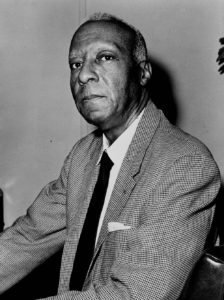Humanist Profile: A. Philip Randolph
 A. Philip Randolph in 1963
A. Philip Randolph in 1963 February is Black History Month in the United States and Canada. In commemoration we bring you the last in a four-part series highlighting fascinating and influential black humanists. Part one profiled writer and activist Ijeoma Oluo, part two profiled James Baldwin, and part three profiled Lorraine Hansberry.
“Look for the enemies of Medicare, of higher minimum wages, of Social Security, of federal aid to education and there you will find the enemy of the Negro, the coalition of Dixiecrats and reactionary Republicans that seek to dominate Congress.”
—A. Philip Randolph, addressing the monumental crowd at the March on Washington on August 28, 1963.
Asa Philip Randolph was born on April 15, 1889, in Crescent City, Florida, the younger son of James William Randolph (a tailor and minister) and Elizabeth Robinson Randolph (a seamstress). Both of his parents were strong advocates for equal rights and James encouraged his sons to read the works of Thomas Paine and Robert Ingersoll, which led to discussions in which Asa questioned the existence of God. He was a strong student and he and his brother attended the Cookman Institute in Jackson, from which he graduated as the valedictorian in 1907.
Randolph moved to Harlem in New York City in 1911, where he flirted with the idea of acting and studied social science at City College. In 1913 he married Lucille Green. The two did not have any children.
In 1917, with fellow socialist and friend Chandler Owen, Randolph started the Messenger, dubbed “the only magazine of scientific radicalism in the world published by Negroes.” The mission statement printed in the first issue read:
Our aim is to appeal to reason, to lift our pens above the cringing demagogy of the times, and above the cheap peanut politics of the old reactionary Negro leaders. Patriotism has no appeal to us; justice has. Party has no weight with us; principle has. Loyalty is meaningless; it depends on what one is loyal to. Prayer is not one of our remedies; it depends on what one is praying for. We consider prayer as nothing more than a fervent wish; consequently the merit and worth of a prayer depend upon what the fervent wish is.
Through the Messenger Randolph promoted the view that black Americans’ challenge was fundamentally economic and that addressing the unfair distribution of power, wealth, and resources in the United States was key to improving the lives of all its citizens. The magazine was also decidedly against American involvement in WWI, and Randolph split from NAACP leader W. E. B. Du Bois who was urging support to “make the world safe for democracy.” Randolph later called that notion “a tremendous offense to the intelligence of the Blacks because at that time the Blacks were being lynched and denied the right to vote.”
In 1925 Randolph organized and served as president of the Brotherhood of Sleeping Car Porters, the first black-led union to receive a charter from the American Federation of Labor. During the 1930s he was president of the National Negro Congress. His efforts to end racial discrimination led to Franklin Roosevelt’s 1941 executive order prohibiting segregation in the armed forces, and in 1955 he became a vice president of the AFL-CIO’s executive council.
Randolph was the visionary director of the historic 1963 March on Washington for Jobs and Freedom, sharing the stage with Rev. Martin Luther King Jr. In 1964 Randolph received the Presidential Medal of Freedom from Lyndon Johnson.
Randolph was identified as a quiet atheist by some, a religious humanist by others. And in spite of some scholars’ assertions that he never fully rejected his African Methodist Episcopal (AME) roots, Randolph accepted the American Humanist Association’s Humanist of the Year Award in 1970 and was a signatory to the Humanist Manifesto II in 1977.
A. Philip Randolph died at the age of ninety on May 16, 1979, at his home in New York City. He was cremated and his ashes were interred at the A. Philip Randolph Institute in Washington, DC.
